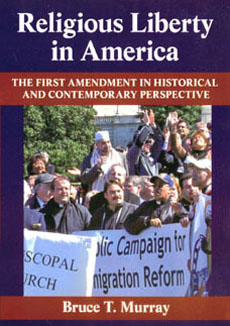Faith-based initiatives redefine relation between church and state
By Bruce T. Murray
Author, Religious Liberty in America: The First Amendment in Historical and Contemporary Perspective
President Barack Obama’s theme of “change” melds seamlessly with “same” in his recent re-establishment of former President Bush’s Faith-Based Initiatives program.
The new White House Office of Faith-Based and Neighborhood Partnerships is a renamed version of George W. Bush’s Faith-Based and Community Initiatives. Obama’s faith-based program, like the former president’s, partners the federal government with religious organizations in the delivery of social services. And like Bush’s program, Obama’s initiative blurs the line separating church and state.

The University of Massachusetts Press book, Religious Liberty in America: The First Amendment in Historical and Contemporary Perspective by Bruce T. Murray, provides an in-depth analysis of faith-based initiatives — from the Bush administration’s program to earlier historical models – reaching as far back as the Poor Laws of Elizabethan England.
Government funding of religious-based social services has a long history in the United States. Such partnerships gained traction during the Reagan administration, and were further codified with “Charitable Choice” legislation during the Clinton administration. A unique, and controversial, aspect of Bush’s Faith-Based and Community Initiative was its connection with the theory of the “unitary executive.” Bush advanced his program at the executive level, without new legislation or the support of Congress.
Obama’s White House Office of Faith-Based and Neighborhood Partnerships is similarly based at the presidential level, and it leaves in place most of the provisions of Bush’s executive orders regarding Faith-Based Initiatives, including the right of faith-based organizations that receive federal funding to hire staff on the basis of religious affiliation. Religious Liberty in America analyzes court challenges to hiring practices and many other church-state challenges to Faith-Based Initiatives.
“The Faith-Based Initiatives program has redrawn the line in the sand that separates church and state. Some say it crosses the line,” Murray writes. “The standoff has spurred an avalanche of lawsuits so numerous that faith-based initiative litigation is approaching its own sub-field of First Amendment law.”
Murray further poses the questions: Can and should government rely on faith-based organizations, which at their core aim to transform lives through the power of God, to provide for the nation’s social service needs? And can this be done without trampling the long-held tradition of “no establishment” of religion? Moreover, can any president who professes a religious affiliation really practice “neutrality” in such matters?
Religious Liberty in America was selected by Choice – a publication of the Association of College and Research Libraries – as an “Outstanding Academic Book.”
“This book is a splendid presentation of the First Amendment – with civil religion as a parallel theme – especially as presently related to so many issues in American political and religious life. Other books on these issues have been appearing of late, but none as clear and thorough as this one.”
— G.H. Shriver, Professor Emeritus, Georgia Southern University
Purchase Religious Liberty in America on the University of Massachusetts Press Web site.
Find out more about the author here.
Faith-Based Initiatives on Cpedia
Cpedia, the automated encyclopedia from Cuil, notes that Religious Liberty in America chronicles the development of government and faith-based partnerships; and how such partnerships are conducted under the mandate of separation of church and state.

